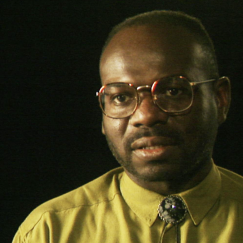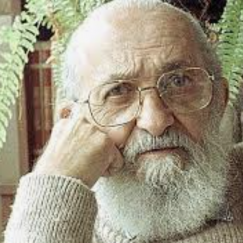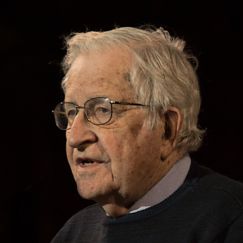Remember that values questions have a “you” in them. The goal is to involve people in relating what they see on the screen to their own lives, not to analyze the filmmaker’s technique or to engage in intellectual criticism. Allow the conversation to flow along a values and feelings track.
Bio/Short Description
Marlon Troy Riggs was a black gay filmmaker, educator, poet, and activist. He produced, wrote, and directed several documentary films including Ethnic Notions, Tongues Untied, Color Adjustment, and Black Is... Black Ain't. His films were a form of media literacy education for viewers who got opportunities to consider how race, gender, and sexuality are represented in media and reflect on how stereotypes shape personal and social identity. Through looking at past and present representations of race and sexuality in the United States, Riggs was able to offer a poetic and humanistic reflection on media's complex role in our daily lives and the need for compassion and empathy in our intersections with others.
HOW THEY INFLUENCED YOU?
External Links
Marlon Riggs Wikipedia
Videos
Trailed for Tongues Untied
Other Grandparents
 Marlon Posted By: Renee HobbsOn:11/29/2023 - 00:56
Marlon Posted By: Renee HobbsOn:11/29/2023 - 00:56
 danahPosted By: Yonty FriesemOn:01/06/2023 - 07:34
danahPosted By: Yonty FriesemOn:01/06/2023 - 07:34
 PaoloPosted By: Renee HobbsOn:07/22/2021 - 16:11
PaoloPosted By: Renee HobbsOn:07/22/2021 - 16:11
 NoamPosted By: Renee HobbsOn:05/23/2020 - 03:48
NoamPosted By: Renee HobbsOn:05/23/2020 - 03:48
 Jon Posted By: Renee HobbsOn:05/10/2020 - 00:12
Jon Posted By: Renee HobbsOn:05/10/2020 - 00:12


Renee Hobbs
I remember seeing Color Adjustment in early 1993 around the time that I was planning the Harvard Institute on Media Education. It was a film that invited viewers to consider the widely differing representations of African Americans on entertainment and news programming. I vividly remember the brutal beating of Rodney King -- was that immediately before or after this film came out? That hugely significant event made racial inequality a topic that was widely discussed by educators and media scholars. We even incorporated a close analysis of the event into the Summer Institute, and that resulted in my first documentary, Tuning in to Media.
During those days, most college teachers used VHS copies of documentaries to help students explore media's role in society. I remember that I asked my college library to buy Ethnic Notions and Tongues Untied and I used them both in my classes. But what made Color Adjustment so powerful was that it confronted how media representations uphold the economic underpinnings of American television and its job in selling the norms and values of consumer culture. The voices of producers, actors, and cultural critics provided substantial context for jump starting a nuanced discussion of capitalism and power in relation to race, class, and gender. But there were no easy answers here -- no heroes, villains, or victims -- because Riggs presented ideas and points of view in ways that encouraged multiperspectival thinking.